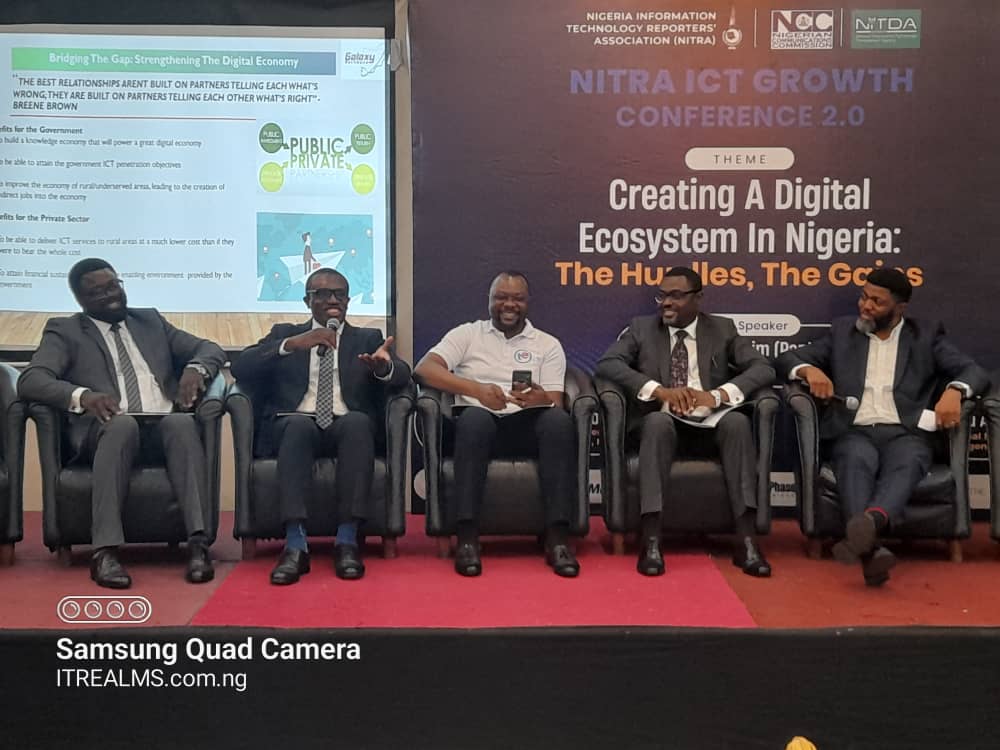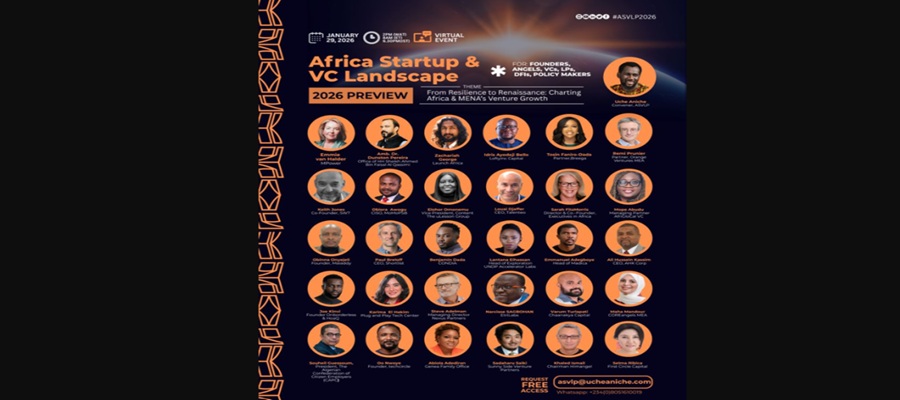Telecom
ICT Experts Harp On The Critical State Of Infrastructure Needs In Nigeria

Panelists at the just concluded NITRA ICT Growth Conference 2.0, have emphasized the need for an urgent review of Nigeria’s state of infrastructure so as to position the country to massively reap the benefits of a digital economy as obtained in some developed nations of the world.

Themed ‘Creating a Digital Ecosystem in Nigeria: The Hurdles, The Gains,’ the panelists drawn from both the public and private sector establishments, were of the consensus that infrastructure provisioning remained Nigeria’s surest pathway to building a robust digital economy.
At a second panel session during proceedings at the NITRA flagship technology conference held at the Oriental Hotel, Lekki Lagos, and moderated by Mr. Peter Oluka, Editor of TechEconomy.ng, the panelists agreed that efforts at building Nigeria’s digital economy cannot yield the much-desired fruit unless there is sustained commitment on the part of the government to prioritise the provision of infrastructure.
Seyi Olarenwaju, CFO of Medallion Data Centre said infrastructure is going to play a vital role in enhancing digital systems in Nigeria’s digital ecosystem, noting that “if there is no infrastructure in place, there is nothing.”
He stated that since governance has now been replaced by electioneering campaigns in preparation for the 2023 general election, the incoming administration should be focused, identify a particular infrastructure, and fix it, and expressed the hope that if in this regard, power is given priority attention, a lot of things will follow suit.
Kelechukwu Nsofor of Rack Centre, a carrier-neutral Tier III data centre who spoke from a data centre provider’s perspective, said power is the key infrastructure that drives a data centre business, describing it as basically the livewire of any data centre.
According to Nsofor, “The key infrastructure that we rely on is power. Power is basically the livewire of any data centre. Unfortunately, if you go back to 1999 since we started the current democratic dispensation in the country, what has been the installed capacity in terms of power? 20 years down the line, where are we today in terms of power?
“At a point, we were generating 1600MW, today, it’s still hovering around 3000MW. Where does that leave us as an economy of over 200 million people? So, if you look at the population growth rate and try to compare it with what we are growing in terms of power, you see that there’s a total disconnect.”
He said that Nigeria is blessed with a rich reservoir of policies and knowledge expertise but expressed worries that this has not been translated to results in the country’s power industry.
“Now, tying that to Rack Centre and indeed the data centre space, we have been generating our own power in the last nine years that we have been operating. And we’ve been fully in control of generating that power now. As we look to expand, we are also looking at ways where we can continue to generate power or do it more cost-effectively.
“We would like a situation where the government will actually stop the lip service that goes into infrastructure like power and actually start showing serious commitment by playing a major role in the provisioning of power infrastructure,” he said.
Noting that the digital economy is all about using the internet basically to push economic activities, Nsofor stated that what is critical even with the efforts at bringing in foreign direct investment, all the marine cables sitting on the coast of Lagos, is how to work with the private sector and knowledge experts basically on how to get things like multiple taxations and right of way out of the road.
“Operators can now push that capacity where it is actually needed. This will help us increase internet penetration, increase the digital economy growth, and push the economy forward,” he concluded.
In his contribution to the discourse, Babalola Olalekan of Phase 3 Telecoms admitted that the government was doing enough to provide infrastructure but stated that there was a need for stronger synergy between the government and service providers.
“There was a document released last year called Strategic Roadmap/Action Plan: A four-year plan 2021-2024. The key performance indices released in that document classified infrastructure in such categories as soft, service and hardware.
“When you look at the hardware infrastructure, we talk about how far we’ve gone in hardware infrastructure deployments like fibre cables. We talk of active devices and so on and so forth. But there’s something the government has put in place especially at the federal level by cutting down right-of-way charges all over the federation.
“Another area we have taken advantage of is the concession plan we call public-private partnership (PPP), where I expect the operators and players to key into and take advantage of our existing infrastructure, and opportunities.
“Another thing I will encourage we should be doing is a collaboration among players. All of us can only fight about a particular position or location. We can join hands on how to collaborate, leverage each other, and supply as a single network.
“So, I think the government is doing enough with policies. The onus is on us to tap into it, put more pressure on the government and be more up and doing in our collaborative efforts and take advantage of what is available to us through the government,” Olalekan said.
He said that going into the 2023 election, the most important thing to be focused on is security, stating that operators have many works to do out there in the field yet, they find it difficult to restore the network in the shortest possible time. “So, whatever government can do to make sure that our roads, our villages, our towns are secured, we will surely have a good general election.”
Chidi Okpala of Galaxy Backbone, in his intervention, acknowledged the fact that government understands the importance of infrastructure in growing the country’s digital economy, noting that one of the things the current administration holds dear to its heart, is infrastructure.
“Have they done all the things expected of them as government? Maybe not. But have they made some efforts in bridging the infrastructure gap? The answer is yes. But there is a whole lot of learning, a whole lot of training in trying to create that awareness, into fully understanding how this impacts the day-to-day living of everyone.
“As an organisation, what we are trying to do is to bridge that gap of understanding especially, people in leadership level in government; to let them understand this is what this infrastructure stands for, this is what it is all about. It is not just for sending emails but how it affects your life, your family, and the work that you do.
“We have done quite a lot together with some of the other organisations within the information technology space in the public sector. We are still doing a lot to raise that awareness of what this infrastructure means so that people can understand more and collaborate more.
“Collaboration is the key, talking about the benefits and not dwelling more on talking about the problems because sometimes when we do that, we cloud ourselves of the opportunities around us,” he said.
Okpala expressed the need for policymakers to be much more intentional about what the country is doing, how it the affects everyone, and how the efforts at building the country’s digital economy can be sustained.
The session, which was anchored by the Editor of TechEconomy, Mr. Peter Oluka, was unanimous with its position that infrastructure is the bedrock of ICT development and global competitiveness in Nigeria.
Telecom
ASVLP 2026: Africa, MENA VCs Gear Up as Tech Funding Hits $4.1bn Rebound

As Africa and MENA’s startup ecosystems transition from post-correction resilience into a new phase of disciplined growth, the Africa Startup & VC Landscape Preview (ASVLP 2026) will convene leading founders, investors, policymakers, and ecosystem builders on January 29, 2026, for its second annual, agenda-setting virtual forum.

Following a challenging global venture cycle, 2025 marked a notable rebound across the African ecosystem, with startups raising an estimated $3.2–$3.3 billion over the full year.
The recovery was accompanied by significant structural shifts: Kenya emerged as the leading destination among Africa’s “Big Four” markets for the first time, while Nigeria recorded a year-on-year funding decline, reflecting changing investor preferences, macroeconomic pressures, and a broader recalibration toward capital efficiency and sustainability.
Sectorally, fintech remained the most funded vertical, while climate & energy, AI-enabled solutions, healthtech, and infrastructure-adjacent businesses gained increasing attention. Across Africa and MENA, development finance institutions (DFIs) and family offices played a more pronounced role in anchoring funds, deploying catalytic capital, and supporting blended-finance structures, reshaping how early-stage and growth capital is mobilized.
ASVLP 2026 is designed to translate these data points into forward-looking strategy.
The forum will bring together venture capitalists, angel investors, LPs, DFIs, family offices, founders, corporate leaders, and regulators from Africa, MENA, Europe, and North America to assess 2025 outcomes and chart priorities for 2026.
The program will feature keynotes, fireside chats, panels, and deep-dive roundtables, including discussions on:
· The 2026 Africa & MENA FinTech Landscape, focusing on security, profitability, regulation, and growth frontiers
· Emerging Fund Managers, capital formation, and LP alignment
· Talent, operator depth, and institutional capacity as constraints to scale
· Regulatory evolution and cross-border market integration
A major highlight of ASVLP 2026 will be the Final DealRoom Pitch Session, where a curated group of high-potential startups will present to an experienced panel of investors.
• Founders can apply to pitch via: bit.ly/ASVLP-DR-Founders
• Investors seeking DealRoom access can request entry via: bit.ly/ASVLP-DR-Investors
Confirmed speakers for ASVLP 2026 include Khaled Ismail (HIMangel), Idris Ayodeji Bello (LoftyInc Capital), Zachariah George (Launch Africa), Tosin Faniro-Dada (Breega), Selma Ribica (FirstCircle Capital), Maha Mandour (COREangels MEA), Joe Kinvi (Borderless), Remi Prunier (Orange Ventures MEA), Karima El Hakim (Plug and Play Tech Center), Souheil Guessoum (President, The Confederation of Citizen Employers – Algeria (CAPC)), Remi Prunier (Partner, Orange Ventures, MEA), Maha Mandour (COREAngels MEA), Ali Hussein (President, Kenyan FinTech Association), Patrick Okebu (CIO, Interswitch Group) among other leading voices shaping capital, policy, and innovation across the region.
“The conversation has shifted,” said Uche Aniche, Convener of ASVLP. “It’s no longer about whether capital will return to Africa and MENA, but what kind of capital, deployed with what discipline, and in service of which long-term outcomes. ASVLP exists to help the ecosystem make sense of that transition.”
Participation in ASVLP 2026 is free but strictly by invitation.
Interested participants are encouraged to repost the official announcement on LinkedIn and comment #ASVLP2026 to receive a private registration link. They could also email [email protected] and request invite.
Telecom
TikTok, Instagram Blamed in US Youth Suicide Lawsuit

Major social media giants Meta Platforms, TikTok and Alphabet’s YouTube will face a landmark jury trial this week in Los Angeles County Superior Court over allegations that their addictive designs have fuelled a youth mental health crisis, marking the first such case to reach this stage.

Social Media
The pivotal personal injury lawsuit centres on a 19-year-old Californian woman identified as K.G.M., who claims her childhood immersion in Instagram, Facebook, YouTube and TikTok—engineered with endless scrolls, autoplay videos, notifications and algorithms—sparked severe anxiety, depression and suicidal thoughts.
Dozens of similar suits have surged since 2022 from families, schools and states, accusing the firms of burying internal research on teen harms while prioritising ad revenue through youth-targeted engagement hooks, despite Section 230 protections for user content.
Plaintiffs seek damages and design overhauls, arguing platforms bypassed parents and preyed on vulnerable kids; defendants counter there’s no clinical “social media addiction” diagnosis, no proven causation—kids with issues often use less—and they’ve added safeguards like parental controls and time limits.
Echoing Australia’s under-16 bans, the trial will scrutinise thousands of internal documents, expert testimonies and K.G.M.’s story, potentially expanding tech liability amid debates where studies show complex links, not direct causation, between screen time and disorders like eating issues or self-harm.
A win could mandate warning labels, age gates or algorithm tweaks, reshaping global platforms as U.S. Surgeon General advisories and global scrutiny intensify pressure on Big Tech to prioritise child safety over profits.
Telecom
Meta Tests Paid Subscriptions Across Instagram, Facebook, WhatsApp

Meta is gearing up to trial paid subscription services on Instagram, Facebook, and WhatsApp, aiming to diversify revenue streams beyond advertising while maintaining free core access for all users.

Meta
The subscriptions will offer enhanced tools tailored for everyday users, creators, and businesses, including advanced content creation, sharing, and workflow features distinct from the existing Meta Verified verification program. Unlike a uniform rollout, Meta plans varied testing formats per app to match diverse audiences, experimenting with feature bundles based on user feedback to refine the model.
A key element involves integrating Manus, the autonomous agent firm Meta acquired for $2 billion in December, into these apps alongside its enterprise sales. Manus enables complex task automation with minimal input, with early signs like Instagram shortcuts already spotted by reverse engineer Alessandro Paluzzi.
Video tools feature prominently: Meta’s Vibes short-form video generator in the Meta AI app shifts to freemium, where paid tiers unlock higher monthly creation limits beyond the free baseline. On Instagram, subscriptions could enable unlimited audience lists, non-follower tracking, and anonymous Story views, though specifics for Facebook and WhatsApp remain under wraps.
Drawing from Meta Verified’s 2023 launch—which provides badges, support, and protection mainly for creators—these broader plans target wider appeal amid industry shifts. Ad growth slows against TikTok competition, while Snapchat+ boasts 16 million subscribers at $3.99 monthly, proving demand for value-driven paid perks despite subscription fatigue risks from streaming and storage fees.
Meta will phase tests gradually, prioritizing feedback to shape long-term viability without alienating free users.

 News3 days ago
News3 days agoLIRS to Invoke NTAA to Recover Unpaid Taxes from Bank Accounts, Others

 News3 days ago
News3 days agoAnambra Cuts Monday Pay to Kill Sit-at-Home

 E-Financial3 days ago
E-Financial3 days agoNIBSS, Others Flag 13,417 Nigerian Fraudsters on Person of Interest Portal

 E-Financial3 days ago
E-Financial3 days agoFirst Asset Management Receives Upgraded Ratings from Agusto &Co and DataPro

 E-Financial3 days ago
E-Financial3 days agoCBN Prepares Fresh Debit Card Rules to Improve ATM Services

 General News3 days ago
General News3 days agoNigeria Treats Religious Violence as Attack on State – NSA Ribadu

 E-Financial2 days ago
E-Financial2 days agoCBN Upgrades Licences of Opay, Moniepoint, Kuda, Palmpay, Paga to National Status
- E-Financial2 days ago
Nigeria’s 9 Top FinTech Firms Valued at $10.6Bn in January 2026



























